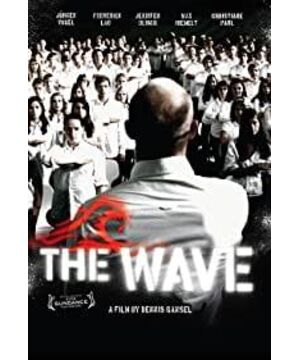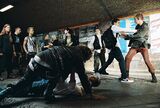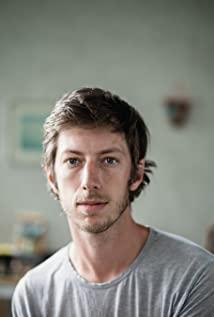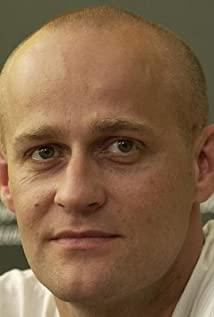"We thought we were superior and better than everyone else. What's more, we excluded all those who opposed us from our collective, and we hurt them. I don't know what else we could do." - Rainer Wenger
The Wave, directed by German director Daniel Gansel, is based on real events that took place in an American high school in 1967. In order to give students a deep understanding of the horror of the Nazi dictatorship, Jones, a high school teacher at the time, proposed to launch an experiment to simulate the Nazis. The group's name was called "The Third Wave". In just a few days, Jones watched students do all kinds of crazy things for the collective. Unlike the film, Jones brakes at the end, causing no casualties, and later shows students the brutality of Nazi Germany during the dictatorship.
The words "unity," "action," "discipline," and "glory" that appear many times in the film followed by the words "casting strength" come from Jones' story. After a lapse of time today, those students who have experienced the "third wave" They are reluctant to talk about what happened back then. And when some viewers commented that the dictatorship in "The Tide" was exaggerated, they actually didn't know that "The Tide" had appeared in the world. In 1981, the German novelist Todd Strasser wrote a novel based on Jones's story, which has today's movie "The Wave".
film language analysis
The film uses a conventional linear narrative technique, using the passage of time to advance the development of the plot. The director cleverly marks the beginning of each day of the activity week, so that the audience can feel how the fascist dictatorship has penetrated into the behavior and thinking of the students in the passage of time.
In addition to the use of lines, the director generously used words such as "Nazi Germany", "Fascism" and "Third Reich" to show Germany's reflection on the suffering caused by "Nazi Germany" in those days. , but also reveals the Germans' sense of social responsibility. Of course, we can also see a new generation of Germans rejecting words such as "Nazi" in the film. Therefore, it is not difficult for us to imagine that when our citizens think that they can wave Hitler's salute in German territory with a playful attitude, the Germans will appear that kind of unconventional truth.
In the first half of the film, a large amount of plot was used to introduce the background of the characters and describe the characters. Although it also made the audience see the shadow of dictatorship in the process of continuous evolution, it was too "water-filled", so that the second half of the film was full of dictatorship. It was a little awkward when it appeared. But this also gives the director enough time to saturate the images of the various characters.
In the dramatic conflict of various characters, the audience is presented with a lively character image.
Although Marco, a water polo player, embraced the two great achievements of appearance and girlfriend, he was confused, restless and a little vain.
The heroine Carlo was also obsessed with that unique dictatorship class, but from the time she was forced to wear a white shirt she didn't like, she had already shown a strong ideology of putting human rights first, and was the main character who first awakened in this film. .
Tim, the soft-footed shrimp, is uncertain about his beliefs and belonging. Although he has no worries about food and clothing, he has infinite emptiness in his heart, but in the end, he clings madly to the "wave" that is empty and restricts freedom, and is forced to the point of suicide.
Reiner, the leader of "Tide", was a well-intentioned experiment to carry out dictatorship, but he fell into it dramatically and couldn't extricate himself. After that, he became more and more inflated, enjoying the thrill of manipulating the members of "Tide", and finally found that he could no longer control the situation and regretted it. And, go to jail.
Showing the horror of dictatorship does not necessarily have to rely on the bloody war. It is actually more realistic to put the stage in our current era. In this regard, the Germans seem to be going further. The director does not limit his vision to a single angle of presentation, but uses multiple angles of plot branches, from the arrogance of the dictator to the deep depression of ordinary students, from the violence of extremists to the confrontation of opponents, multi-angle analysis In the end, each broke out in the last scene, blowing up the ghost of fascism. Turns out they were right next to us.
Ghost of Fascism
Many people may have misunderstandings about the meaning of dictatorship. The explanation given in the film is that "a certain person or a certain group rules the majority of the people" "has great power and can freely change the law", when the members of this group form an opposition to the group. Fascist dictatorships are formed when there is absolute obedience to orders, there is no justification for right or wrong, and when the orders given by the organization are carried out mechanically.
Like the naive students in the film, we also thought that the fascist dictatorship was long gone, but its specter has always lingered in every corner of our society. When we fail to keep our bottom line, we are effectively reduced to a system or a beast manipulated by a dictatorial leader. In the film, the authoritarian nature of the "wave" was not reflected in the early stage. In the later stage, the proliferation of collective supremacy made all members act with the collective as the first priority. They can put stickers on the streets, spray logos, and damage public property. They can force the audience to wear white shirts in front of the swimming pool, or they can crowd out and betray their friends for the collective, as if for the collective everything makes sense and does it. In the process, they enjoy the sense of belonging brought by the so-called "discipline", "honor" and "unity", and they serve their "wave" organization even more vigorously.
On the last day, the dictatorial orgy reached its climax. When Reiner walked into the auditorium, all the members stood up and greeted the leader with a "wave" greeting, which reminded me of the Nazis in "The Destruction of the Empire" who held out their hands to the German officers and waved Nazis. Soldier. Under the instigation of Reiner, they clamored to subvert German society and eradicate opponents. But who would know that five days ago, they were still talking about the ideals of dictatorship long ago in the classroom, but they didn't know that their future self would be haunted by the ghost of fascism.
In reality, we have also encountered fascist re-invasion. The indiscriminate atrocities committed by the Red Guards during the Cultural Revolution of the last century actually contained a strong fascist overtone. As for why Reiner's methods of training students are so similar to those of primary and secondary schools in our country, I won't say more, and everyone can make up their own minds.
At the end, when Reiner was brought into the police car, the director's set of moving shots showed the eyes of the German public in or outside the incident to Reiner. Either disappointment, doubt, sadness, or consternation, but they all show a kind of rejection, which is actually a wake-up call. For the look of consternation that looks like Song Kanghao at the end of "Memories of Murder", Reiner's look of consternation in the police car at the end, what did he see, the film does not leave an answer, but it doesn't matter. The important thing is whether we can keep our bottom line under the constraints of the system and be vigilant that we will not become a puppet manipulated by the fascist ghost.
View more about The Wave reviews











